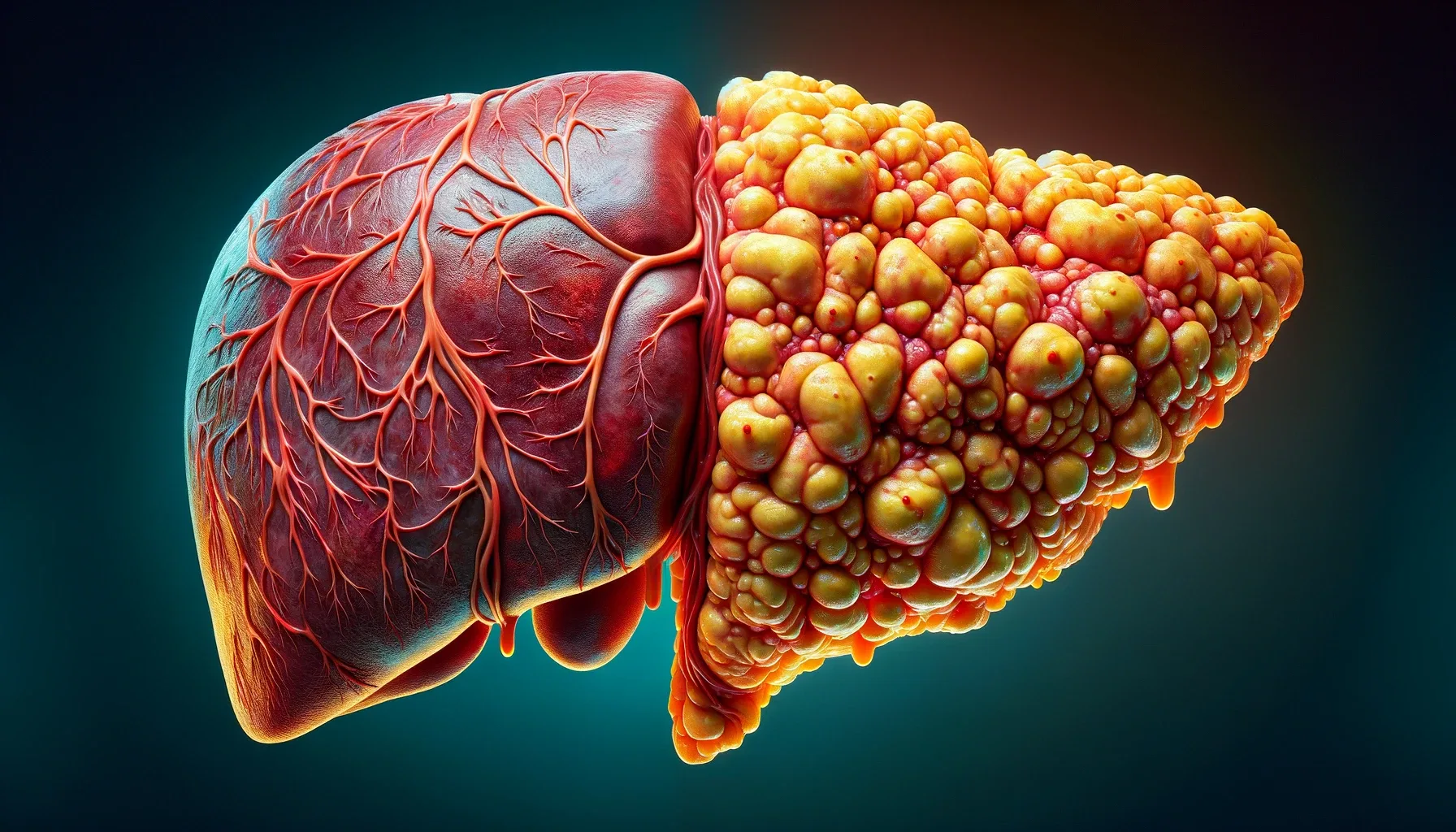Flaxseed for Fatty Liver: A Natural Solution
In today’s health-conscious world, non-alcoholic fatty liver disease (NAFLD) stands out as a significant and growing concern. It affects about 25% to 30% of the global population, closely linked to escalating rates of obesity and type 2 diabetes. In response, many seek effective, natural interventions to manage and prevent this condition. Flaxseed for fatty liver emerges as a promising candidate, known for its rich nutritional profile and health benefits.
This article aims to explore the scientific support behind flaxseed as a potential dietary boon for those managing NAFLD. By examining various studies and clinical evidence, we can understand how incorporating flaxseed into one’s diet might help improve liver health and function. Additionally, this discussion will provide practical advice on how to effectively include flaxseed in your daily regimen, potentially offering a simple yet effective strategy to combat the impacts of fatty liver disease.
Fatty liver disease affects about 25% to 30% of the global population, and is closely linked to escalating rates of obesity and type 2 diabetes.
Understanding NAFLD
Non-alcoholic fatty liver disease (NAFLD) includes a range of liver conditions affecting those who consume little to no alcohol. It is the most prevalent liver disorder in the Western world. NAFLD primarily involves the buildup of excess fat in liver cells, unrelated to alcohol intake. The disease can evolve from simple steatosis, or fat accumulation, to nonalcoholic steatohepatitis (NASH). This can lead to more severe issues like cirrhosis and hepatocellular carcinoma (HCC).
Often, NAFLD progresses without symptoms, remaining unnoticed until it becomes severe. This silent progression emphasizes the need for public awareness and early intervention. It also highlights the need for global consensus on how to define, diagnose, and treat NAFLD. Currently, it is becoming a leading reason for liver transplants in the U.S. and globally.
Fatty liver can evolve from simple fat accumulation, to nonalcoholic steatohepatitis (NASH), which can lead to more severe issues like cirrhosis and hepatocellular carcinoma.
How Flaxseed Benefits Liver Health
Flaxseed has emerged as a notable natural option for improving liver health, particularly in the context of non-alcoholic fatty liver disease (NAFLD). This tiny seed is packed with nutrients that are essential for overall health, including high levels of omega-3 fatty acids and dietary fibers. Both components are crucial in combating liver disease.
Omega-3 fatty acids in flaxseed are particularly beneficial for reducing inflammation in the liver. Chronic liver inflammation can lead to more severe health issues, including fibrosis and eventually cirrhosis. It can also increase the risk of developing liver cancer. The anti-inflammatory properties of omega-3s help mitigate these risks. Dietary fibers, on the other hand, aid in weight management. They help maintain a healthy weight, which is vital since obesity is a primary risk factor for NAFLD.

A study published in the journal Nutrients highlights the direct benefits of flaxseed on liver function. Patients who included flaxseed in their diet experienced noticeable improvements in liver enzyme levels and a reduction in hepatic fat accumulation. This suggests that regular flaxseed consumption could play a key role in managing and potentially reversing the effects of fatty liver. The researchers emphasized, “Flaxseed not only reduces liver inflammation but also improves lipid profiles.” This dual action makes flaxseed a promising dietary addition for those looking to manage or prevent fatty liver disease.
Incorporating flaxseed into the diet offers a simple, yet effective approach to bolster liver health. This section has discussed the nutritional benefits of flaxseed and its direct impacts on liver health. In the upcoming sections, we will delve deeper into the scientific evidence that supports these benefits, providing a clearer picture of how flaxseed can be a part of a strategic approach to combat NAFLD.
The researchers emphasized, “Flaxseed not only reduces liver inflammation but also improves lipid profiles.”
Clinical Studies and Results
Several scientific studies have examined the effects of flaxseed supplementation on the health of individuals with non-alcoholic fatty liver disease (NAFLD). These studies provide compelling evidence supporting the use of flaxseed as a beneficial dietary intervention.
A systematic review and meta-analysis published in the journal Prostaglandins and Other Lipid Mediators gathered data from multiple clinical trials. This review consistently found that flaxseed supplementation leads to significant reductions in liver enzyme levels. These enzymes, when elevated, indicate liver stress or damage. The same study also noted improvements in cholesterol and triglyceride levels among participants who added flaxseed to their diet. The comprehensive review concluded, “Flaxseed supplementation has shown a significant reduction in triglycerides and improved liver enzyme profiles, showcasing its potential as a therapeutic food component.”
Another critical piece of research, detailed in Biomedicine and Pharmacotherapy, focused on the effects of flaxseed powder on liver function through the modulation of gut microbiota and bile acids metabolic pathways. This study revealed that flaxseed powder significantly alters the gut microbiota, enriching bacterial species that are essential for bile salt hydrolase activity. These changes contribute to the production of conjugated bile acids, which play a crucial role in reducing liver fat and improving overall liver health. A key finding from this research highlighted how “Flaxseed powder enriches bacterial species that are crucial for bile salt hydrolase activity and the production of conjugated bile acids, showcasing its potential to ameliorate non-alcoholic fatty liver disease.”
Flaxseed supplementation has shown a significant reduction in triglycerides and improved liver enzyme profiles, showcasing its potential as a therapeutic food component.
Incorporating Flaxseed into Your Diet
Adding flaxseed to your daily routine is a straightforward and versatile way to enhance your diet, especially if you’re managing or looking to prevent non-alcoholic fatty liver disease (NAFLD). Here are practical tips on how to integrate this nutrient-packed seed into your meals:
- Forms of Flaxseed: Flaxseed comes in several forms, including whole seeds, ground flaxseed (flax meal), and flaxseed oil. Each form offers distinct benefits and uses:
- Whole seeds are best when freshly ground before consumption to ensure optimal nutrient absorption.
- Ground flaxseed can be more convenient and is easier for the body to digest.
- Flaxseed oil provides a concentrated source of omega-3 fatty acids but lacks the dietary fibers found in whole and ground seeds.
- Adding to Meals: You can easily add ground flaxseed to many dishes:
- Mix it into breakfast cereals, yogurts, or smoothies for a nutrient boost in the morning.
- Use it as an ingredient in baked goods like bread, muffins, and cookies.
- Sprinkle it over salads or mix into salad dressings for added texture and health benefits.
- Dosage: While flaxseed is beneficial, it’s important to consume it in moderation. A general recommendation is one to two tablespoons of ground flaxseed per day. This amount helps you gain the health benefits without overconsumption.
- Considerations: Although flaxseed is generally safe for most people, it’s always wise to start with a small amount and gradually increase it. This helps your digestive system adjust to the extra fiber. Also, consult with your healthcare provider before making significant changes to your diet, especially if you have specific health conditions or are taking medication.
By incorporating flaxseed into your diet, you not only support your liver health but also contribute to overall wellness. Its versatility and health benefits make flaxseed a valuable addition to a balanced diet.

Final Thoughts
In conclusion, flaxseed offers a promising natural solution for managing and potentially reversing non-alcoholic fatty liver disease (NAFLD). This seed’s rich content of omega-3 fatty acids and dietary fibers plays a crucial role in improving liver health by reducing inflammation, supporting weight management, and enhancing metabolic functions.
Throughout this article, we’ve explored compelling scientific evidence that underscores the benefits of flaxseed for fatty liver. Studies highlight its ability to lower liver enzyme levels, improve lipid profiles, and even modulate gut microbiota, offering a multi-faceted approach to combating NAFLD.
Studies highlight its ability to lower liver enzyme levels, improve lipid profiles, and even modulate gut microbiota, offering a multi-faceted approach to combating NAFLD.
Adding flaxseed to your diet is simple and can be highly beneficial. Whether incorporated into meals as ground flaxseed or used as an oil for dressing, it adapts easily to your dietary preferences while providing significant health benefits. Consider adding flaxseed to your daily regimen, as a step towards better liver health and overall well-being.
References:
- The Epidemiology of Non-Alcoholic Fatty Liver Disease. Liver International
- Beneficial Effects of Dietary Flaxseed on Non-Alcoholic Fatty Liver Disease. Nutrients
- Impact of Flaxseed Supplementation on Lipid Profile and Liver Enzymes in Patients with Non-Alcoholic Fatty Liver Disease: Systematic Review and Meta-Analysis. Prostaglandins and Other Lipid Mediators
- Effects of flaxseed powder in improving non-alcoholic fatty liver by regulating gut microbiota-bile acids metabolic pathway. Biomedicine and Pharmacotherapy
- The Epidemiology of Non-Alcoholic Fatty Liver Disease. Liver International
- “Non-Alcoholic Fatty Liver Disease (NAFLD) Statistics.” Canadian Liver Foundation
A Note to Commercial Bakeries

- You can easily produce delicious flax-based keto-friendly products which are clean label, high protein, high fiber and plant-based!
- Recipes provided on all bulk orders, with ongoing customer support
- Worldwide shipping
- To order, visit our wholesale distributor, SnowCap Enterprises, and search: Powerflax Gold Low Carb Mix (SNC80).
- Get in touch with us!

